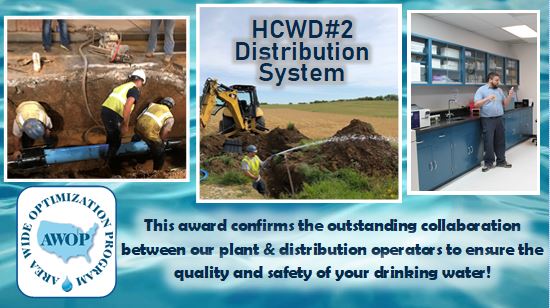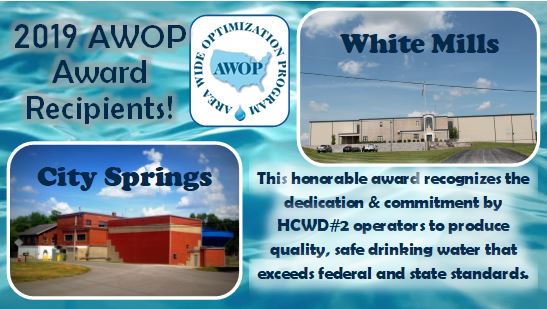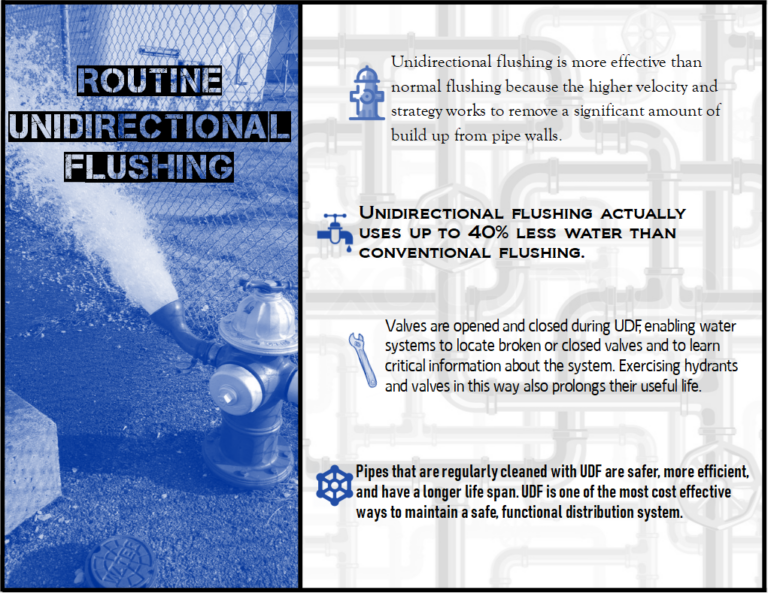What does water taste like? At Hardin County Water District No. 2, we like to say it tastes like ‘Quality!’ Through testing the chemical, physical, biological, and radiological parameters of the water and routinely flushing service lines, our mission is to provide Safe, Healthy, and Delicious drinking water to your tap.


Routine Flushing
As water flows throughout the distribution system and ages, some of the water quality parameters may change. In order to retain freshness and peak water quality, crews will flush certain areas within the distribution system on a scheduled basis. This ensures that the water you receive at the tap contains a maximum level of disinfectant and minimum taste and odor issues. Flushing is increased during warmer times of the year as the heat degrades disinfection chemicals quicker.
Water running from a fire hydrant or blow-off valve may be an indication that the water district is conducting routine flushing; If you see a HCWD#2 crew or employee flushing, do not be alarmed. Just wave hello!

Lead Exposure
Homes built before the 1930’s are likely to have lead plumbing and pipes, while homes built before 1986 are likely to have lead-soldered joints. For more certainty, the consultation of a licensed plumber may be required. Soft water or water that remains stationary for extended periods of time in lead service lines, lead pipe, or copper pipe with lead soldering may contribute to higher levels of lead in your drinking water.
If your home meets any of these criteria, the following practices are advised in order to minimize your exposure to lead:
– Flush tap before drinking or cooking (at least 30 seconds and up to 2 minutes)
– Do not cook with or drink hot water from the faucet
– Replace lead piping and soldering with certified lead-free materials
For more information on lead exposure, refer to the link below from the Environmental Protection Agency.
The finished water is checked and tested every day at both the White Mills Treatment Plant and City Springs Treatment plant to ensure that the water is not corrosive to piping. The corrosivity of the water may be altered by a customer’s in-house softener system.
Public water systems in Kentucky have also been monitoring water within households since the implementation of the federal Lead and Copper Rule in the early 1990s. Lead levels are sampled regularly by public water systems at residences and businesses to ensure drinking water is safe.
The Lead and Copper Rule requires water systems to sample a number of households in their distribution system (based on population). The sampling focuses on monitoring the households most vulnerable to lead and copper contamination, such as single-family homes that contain copper pipes with lead solder, contain lead pipes, or are served by a lead service line.
Lead and copper testing conducted by HCWD#2 indicate levels are safely below the EPA action threshold. The results of this sampling are included in our Consumer Confidence Report (CCR).
For more information on the lead and copper sampling program, refer to the information below from the Kentucky Division of Water.
Calcium & Sediment
Dissolved calcium and minerals in the water are a natural occurrence in Kentucky’s limestone-laden karst landscape. When the water is cool and flowing, these minerals will normally stay in solution. Over time and under certain conditions, calcium scale and ‘sediment’ may build up within your home’s pipe system. To remediate this issue, HCWD#2 recommends:
– Performing yearly maintenance on your water heater. This includes flushing the unit and setting the temperature to no more than 120° F (many water heaters are set between 130-140°F by default)
– Removing the screen from faucets and flushing accumulated calcium. Vinegar can aid in dissolving the calcium buildup.
Water Softeners, Filters, & Appliances
For our customers who opt to install a water softener, the appropriate settings will depend on where in the distribution system you live. Those who are served by the City Springs Treatment Plant should set their softeners at 16.6 grains per gallon. Customers served by the White Mills Treatment Plant should set their softeners at 10.6 grains per gallon. Be sure to maintain your water softeners according to the manufacturer’s specifications. This includes maintaining a certain level of salt within the unit.
Customers who opt to use water filters in their homes should remember that these filters will eventually harbor bacteria and calcium/sediment if they are not changed on a frequent and routine basis.
The presence of an oily residue, black particles, or rubber specks in your water is likely an indication that a gasket in your plumbing is deteriorating and should be replaced.
When the trap under a sink becomes dry or clogs up, a sewage or sulfur smell may emanate from the drain as the organic matter in the trap is decaying. The source of this odor is sometimes mistaken for tap water, when in fact it is coming from the drain. To remedy this issue, customers should flush their trap with vinegar, boiling water, or a drain-cleaning chemical.
Microbiological Laboratory
The White Mills Microbiological Laboratory has been operating since October of 2001 providing bacteriological analyses for Hardin and surrounding counties. The lab now employs several laboratory technicians who perform hundreds of analyses each month. The samples analyzed are tested for total coliform and E. coli bacteria. Testing for total coliform and E. coli bacteria can be performed on any water sample including samples from privately owned wells.
If you would like to have a sample analyzed, please contact the White Mills laboratory during the laboratory hours of 7:30 a.m. to 4:00 p.m. Monday – Friday at (270) 862-3213 or e-mail them at whitemillslab@hcwd2.org for sampling bottles and procedures. A fee schedule for sampling analysis is printed below (not including tax).
Analysis Fee Schedule
Total Coliform/ E. coli Public Water Supply—$25.00 per sample
- Well Sample—$35.00 per sample
– The report from testing well water will not indicate that the water is safe to drink. White Mills Laboratory is certified only to enumerate the amount of total coliform bacteria and E. coli in 100ml of well water. The presence of a multitude of other chemicals and compounds will remain unknown. It is the responsibility of the property owner to consult with commercial laboratories to ascertain the potability of their well water.
- Heterotrophic Plate Count $40.00 per sample
- Collection Fee Inside service area—$50.00 per sample (outside area, add $50 per hour & mileage)
- Overtime Rate $50.00 per hour
Hardin County Water District No. 2 strives to not only meet the requirements set forth by the federal and state governments but works to excel above and beyond those requirements. Click on the links below to view an online copy of our Consumer Confidence Report that includes our water quality results and other news. Should you have any questions, let us know.

